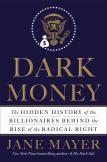Power for Sale
Over a century after President Theodore Roosevelt denounced “malefactors of great wealth” and aided the Progressive movement’s adoption of rules to check corporate excess, a handful of billionaires has launched a sweeping, privately financed war to turn the country back to the Gilded Age and destroy these rules. Masquerading as “social welfare organizations,” these political allies have used the tax laws to hide their contributions and to emerge after a 40-year ideological campaign as what Jane Mayer calls “the single most effective special-interest group in the country.”
Although Dark Money exhaustively describes the complex network of nonprofit foundations the billionaires have created, the narrative focuses on Charles and David Koch, the brothers who own Koch Industries, a fossil fuel conglomerate based in Wichita, Kan., and the second largest privately owned company in the United States. The two Koch brothers have used their fortunes, estimated by Forbes in 2015 at $41.6 billion each, to create a fully integrated network of think tanks, lobbying groups, academic programs and political candidates committed to their antitax, antigovernment philosophy. Fred Chase Koch, the brothers’ father, created the family fortune in the 1930s by building oil refineries for Stalin and Hitler and helped found the John Birch Society in 1958, an archconservative group that believed Communists dominated the government. Since 1980, when David ran for vice president on the Libertarian Party ticket, the brothers have spent millions of dollars to move their views from the fringes to the center of American political life.
In a brilliant analysis of the Kochs’ steadily increasing influence, Jane Mayer shows how their philosophical opposition to government regulations coincided with their private interests. Whatever their motivations, for a quarter of a century “between 1980 and 2005, under Charles Koch’s leadership, his company developed a stunning record of corporate malfeasance,” she writes, including record fines for allowing benzene and crude oil to leach into ground water, firing whistleblowers, stealing oil from an Indian tribe and, more recently, even trying to dig up dirt on Jane Mayer. In 2012, the Environmental Protection Agency’s database revealed Koch Industries to be the country’s number one producer of toxic waste. According to one long-time employee, constant litigation with the E.P.A. did not affect the company’s bottom line because “if they got fined, it didn’t matter because they made so much money.” Despite the Kochs’ unceasing complaints about the Obama administration’s enforcement of environmental regulations, their personal wealth has tripled since 2009.
The tax code has helped the Kochs and their billionaire allies increase their influence. Richard Mellon Scaife, an early practitioner of “advocacy philanthropy,” spent much of his fortune in the late 1970s investing in conservative think tanks, including the Heritage Foundation. The John M. Olin Foundation bankrolled the creation of right-wing academic centers and professorships on college campuses. By 2013 there were over 100,000 private foundations with assets of over $800 billion, “completely irresponsible institutions, answerable to nobody,” according to Richard Posner, the conservative judge and legal scholar. Of particular interest to the Kochs, the brothers contributed to foundations that cast doubt on the science of climate change, lobbied against a carbon tax and created the Tea Party movement.
Private foundations have few legal restrictions. The I.R.S. only requires them to donate 5 percent of their assets annually to public charities or nonprofit organizations. Donations to section 501(c)(3) educational nonprofits are tax deductible. Section 501(c)(4) “social welfare” groups may engage in politics so long as politics is not their primary purpose, and they need not disclose their donors. The Kochs and their allies were part of an explosion of dark money. They funded two groups that spent heavily in the 2010 midterms—the Center for Patient Rights, an anti-Obamacare group, and Crossroads GPS, a group initiated by Karl Rove.
The Supreme Court’s Citizens United decision in 2010 fueled this explosion. The 5-to-4 decision overturned Progressive-era restrictions banning corporations and unions from unlimited spending on political candidates. So long as businesses and unions did not directly fund candidates, they could give as much as they wanted to outside groups that were technically independent of the campaigns. In granting free speech rights to corporations, the court assumed that corporate expenditures would be transparent and thus free from the taint of corruption. But as Mayer convincingly shows, that assumption proved incorrect “as more and more of the money flooding into elections was spent by secretive nonprofit organizations that claimed the right to conceal their donors’ identities.” By contributing to Donors Trust, “the dark-money ATM of the conservative movement” that in turn distributed money to their preferred candidates and causes, donors were able to hide their identities.
The hosts of private semi-annual donors meetings, the Kochs have raised pledges of $889 million for the 2016 elections. The $2 million that W. Clement Stone contributed to Richard Nixon in 1972 ($11 million in today’s dollars) seems almost quaint by comparison, though it outraged the public and contributed to post-Watergate campaign finance laws. These laws have been largely gutted by the Supreme Court, suggesting the need for a new Progressive movement. Just as journalists stirred the public to action in the first decade of the last century, Mayer has written a powerful call for much-needed reform.
This article also appeared in print, under the headline “Power for Sale,” in the March 28, 2016, issue.








